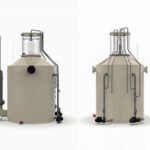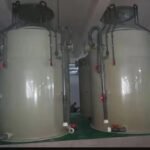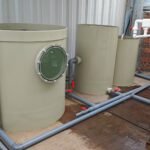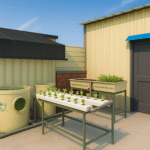How a Protein Skimmer Works in RAS
1. Basic Principle
Protein skimmers use fine air bubbles to attract and remove:
Dissolved organic wastes (proteins, fats, fish mucus, uneaten feed).
Fine particulate matter (before it decomposes).
Some bacteria and pathogens.
2. Step-by-Step Process
Water & Air Mixing: Water enters the skimmer and mixes with micro bubbles (generated by a venturi, air stone, or needle wheel pump).
Adsorption of Organics: Organic molecules (hydrophobic) stick to the air-water interface of the bubbles。
Foam Formation: The bubbles rise, creating foam loaded with waste.
Waste Removal: Foam overflows into a collection cup, where it is removed from the system.
Why Use a Protein Skimmer in RAS
✅ Reduces organic load before biofilter (extends biofilter life).
✅ Improves water clarity (removes yellowing tannins and fine particles).
✅ Lowers disease risk (removes bacteria and pathogens).
✅ Enhances oxygen levels (from aeration).
Works best in saltwater (freshwater needs additives to improve skimming).
Not a substitute for biofiltration (does not remove ammonia/nitrite).
Optimizing Protein Skimmer Performance
Adjust bubble density (wet foam vs. dry foam).
Clean collection cup regularly (prevents overflow).
Position skimmer before biofilter (to reduce organic load).
Use ozone (O₃) injection (increases skimming efficiency).
Protein Skimmer (10-200m3/h)for RAS
Mandatory for marine RAS (shrimp, seabass, etc.).
Useful in high-density freshwater RAS (tilapia, trout) if organic load is high.




